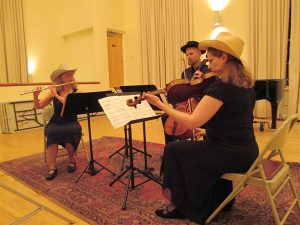This is the second in an ongoing series of blog posts by the people behind the return of A Fleeting Animal in September, 2015.

When Erik came to me with the idea of turning a part of JUDEVINE into an opera, I, of course, said yes. After we decided on which part of the play we would use for the opera, almost immediately, I came up with the idea of including some black characters. I have an especial interest in Black Americans and their plight (see my latest play DIFFERENT PLANET: go to my website: www.davidbudbill.com/ and plays. It’s the top one.) and this was my golden opportunity to address that interest. As everybody knows, Vermont is one of the whitest states in the United States. Where and how was I going to incorporate some black folks? Simple. Tommy Stames leaves Judevine, Vermont, and goes to Vietnam where he becomes friends with two black guys who subsequently visit Tommy, and Grace in Judevine, in their trailer down along the river. In the scene at the beginning of Act II, “At the Landing”, Doug refers to the two black guys Tommy has visiting him as “darkies” and “jungle-bunnies.” He does this to goad Tommy into a fury over his, Doug’s, racism. It works.
It all seemed so natural to add the two Black guys, since, although not of the same race, they were from the same class in the society–for lack of better words, from the working class, the working poor, that strata of society that fights all our wars.
Adding two black characters was easy enough, and while I had the play broken open, I could write new parts for Tommy and Grace also, which I did.
And then there was the matter of the Angel of Depression. Tommy, in his poems for Grace, in a book called OH! in the book JUDEVINE (a book within the book), Tommy mentions the Angel of Depression a number of times. In OH! she is only referred to, but Erik and I saw an opportunity to make her into a character in the Opera and we did. There is a piece of a scene (Act II, Scene 2) between The Angel of Depression and Tommy that, I think, deepens Tommy’s struggle with his depression.
There is a picture (in rehearsal clothes) from the original production of Tommy and Grace and the Angel of Depression. If you’d like to see it, it’s at: http://www.davidbudbill.com/262/a-fleeting-animal. Scroll down to the first picture.
Additionally: I expanded the argument between Bobbie and Doug about Grace, ending with Bobbie telling Doug he can find his own way home and Antoine telling Doug that he’ll take him home.
Tommy, Grace, William and James then engage in a discussion about who their people were and are now and Grace confesses that, although she wants to feel at home with William and James, she just does not.
Act I ends with somebody hitting a bear with their car and the bear in agony writhes around in the ditch. Tommy sees this and immediately has a flash-back to shooting his friend who is in agony in Vietnam. Act I ends with Tommy saying/singing “Don’t talk to me!”
Act II begins with the “At the Landing, a scene in which Doug goes after Tommy and his black friends. (see the first paragraph of this essay.)
This is followed by a Dream Sequence in which Grace, Tommy and the Angel of Depression sing to each other about Tommy’s upcoming death.
Then some comic relief, sorely needed by now. We see the town playing softball and Grace watching Tommy. This scene also gave me lots of room to create plenty of double entendres.
Scenes 4 and 5, in Act II, are a Pastoral Interlude in which Tommy and Grace, William and James sing to each other about how beautiful their lives are or could be. Then the scene this entire opera has been building toward: Tommy’s Death.
Scene 6: Act II: Grace, now alone, warns the people of Judevine that if they don’t wake up and start dealing with the veterans of Vietnam and their survivors that they will have hell to pay.
Then a final chorus, in which Grace, having lost her mind, talks about her new boy-friend in New York, then meets William and James and doesn’t recognize them.
The Angel of Depression, William and James lead Grace off. The Angel of Depression has the last lines. The opera is done.
What appeals to me about this opera is that music heightens everything. Music makes the emotions more intense and devastating. It ups the ante on everything. For someone like me, who wants to tear your heart out, music is made to order for what I want to do.
–David Budbill
Join us!
Make a tax-deductible contribution for this opera through the Monteverdi Music School, a registered 501(c)(3) non-profit organization.
Contributions may be directed to:
Monteverdi Music School, P.O. Box 1062, Montpelier, VT 05601-1062
Please put A Fleeting Animal in your check’s memo line.
Or if you’d prefer to make a secure contribution online, go to:
http://monteverdimusic.org/
Please put A Fleeting Animal in the “purpose” field.
Back to the A Fleeting Animal.
- A Fleeting Animal July 21, 2020
- Reflections on A Fleeting Animal, the Nielsen-Budbill Vermont Opera by Linda Henzel April 29, 2015
- STAGE ONE COMPLETED! February 20, 2015
- A Reflection by Margaret Ramsdell February 6, 2015
- An End-of-year update December 16, 2014
- Update: wonderful progress on several fronts! November 25, 2014
- My Hatch Fund Campaign November 3, 2014
- A personal recollection by Leane Garland October 6, 2014
- What I Did to Rewrite the Play for the Opera by David Budbill September 17, 2014
- A Fleeting Animal Returns! September 1, 2014


